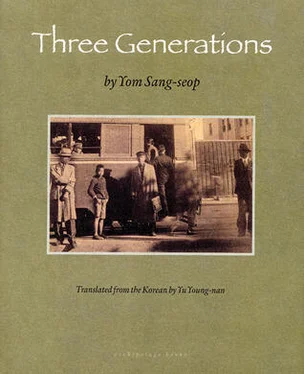Gyeong-ae kept flashing her eyes at her mother without success, so she finally cut her off. “Why are you telling these things to this gentleman?”
Her mother stopped out of sheer surprise, but she had a hard time suppressing her anger. Her face reddening, she said to Deok-gi, “Well, just go and tell him how hard it’s been for an old woman like me to raise the girl.”
Deok-gi was startled at this unexpected scolding, but he sat with his head bowed, as silent as someone with a mouthful of stolen honey. He was curious to know why his father and Gyeong-ae had parted ways, but he couldn’t ask either of them.
“Just because he lets us stay in this grand house of his, he thinks he doesn’t have to look after the child. Why did he have the child in the first place, then?” As the mother resumed her litany, Gyeong-ae scowled and sharply told her to go to the other room. The old woman’s chiding words, which were unfairly directed at Deok-gi, made him feel uncomfortable, but there was nothing he could do about it. So this is the house my father bought for them. He hoped the old woman would continue her rant, if only to satisfy his curiosity.
“Why can’t I say what’s on my mind? What have we done wrong? A son ought to hear about the misdeeds of his father. Both you and this child have the misfortune of having a bad father,” she said, addressing Deok-gi but pointing to the girl on Gyeong-ae’s lap. “You should take this child away with you. Looks like you’ve returned home from your studies. If your father won’t take her in and raise her, you’ll have to do it yourself. You wouldn’t feel it’s unfair to raise your own sister, would you?”
“Please calm down,” Deok-gi finally managed to say. “I’ll figure something out. But first, don’t you think we should give her some medicine to make her feel better?”
“Mother, how can you say such things to someone who doesn’t know the whole story? Now please go to the other room,” Gyeong-ae insisted, this time deeply annoyed.

“Don’t even think about telling your father that you saw me,” said Gyeong-ae after her mother had gone. Her voice had been calm enough when she had stopped her mother from lashing out, but now it was tinged with anger. Her mother had stirred up a dormant wrath.
“If it weren’t for this child, I wouldn’t have stopped you in the street, let alone brought you here. Your father never thought about the baby at all. He was too afraid of rumors going around the church that he had deflowered a young girl and fathered her child. He thought everything would be fine as long as he maintained his social status, so he dumped me. I didn’t beg him to take me back then, and I don’t even want to speak to him now.” Gyeong-ae spoke calmly, but her voice contained deep resentment.
“I know I’ve made mistakes,” she said, after a long pause. “My mother, for all she said — ” She broke off to mull something over; she picked up the small paper bag at the head of the bedding. Counting out the pills, she shouted to the maid in the other room, asking whether the water was warm yet.
By mistakes, Gyeong-ae meant that it was her own vanity that sparked the affair. Her mother hadn’t acted admirably either, despite her posturing. At the time Gyeong-ae was involved with Deok-gi’s father, he was a gentleman who preached eloquently, a good-looking man in his prime, less than forty years old. He had lived in America for almost two years. Thanks to the prestige of family money, he enjoyed great popularity within the church, and he caught the eye of all the young women in the community.
The maid entered with a child-sized brass bowl.
The little girl had calmed down, though she was still very congested. But when she spotted the medicine and the water bowl, she burst into tears, as if she had been burned. Somehow, Gyeong-ae managed to push three tablets down her throat as the child slid down from her mother’s lap, her arms and legs flailing. Deok-gi helped get her to swallow the medicine and then smiled, proud of himself.
Deok-gi’s memories of the past were vivid.
Eight or nine years had passed since Deok-gi and Gyeong-ae graduated from the elementary school near Namdaemun. Gyeong-ae joined the school in the middle of the third grade. Of course, boys and girls attended different classes, and Gyeong-ae was two years older than Deok-gi, but they were placed in the same grade.
The school was church-affiliated, and Deok-gi’s father was one of the founders. Since Deok-gi was a member of the church, his father sent him to this school, far from their Hwagae-dong home, rather than to the nearby public school.
When the two met, both were acting in the annual Christmas play. Ten-year-old Deok-gi and twelve-year-old Gyeong-ae were star pupils. Both were good-looking and talented, and both excelled at singing, acting, and elocution. Deok-gi hadn’t always been very aware of his fellow students, but to this day he still remembered how Gyeong-ae, a girl two years his senior, had been friendly to him.
After school, when the students would stream out in groups, the two would walk side by side up to Namdaemun. Gyeong-ae would shout, “Good-bye!” and head for Bongnaegyo. Deok-gi never knew that she was actually from Suwon, that her father was in prison, and that she lived with her maternal uncle’s family near Migeun-dong.
What stood out in his memory now was a day in the fourth or fifth grade. The students had come to school to rehearse the Christmas play, and Gyeong-ae and Deok-gi left the school grounds to buy some Japanese rice cakes, which they shared. A classmate snitched on them, and although Deok-gi escaped a scolding, Gyeong-ae was severely reprimanded by a schoolmistress, who said a big girl as old as thirteen shouldn’t be buying snacks for herself or her friends against school rules. Gyeong-ae was not allowed to sing that day and stood weeping outside the classroom all afternoon. How vividly Deok-gi recalled that day!
Now Gyeong-ae was holding Deok-gi’s sister in front of him and bitterness rose in him. Deok-gi wasn’t sure whether to laugh or cry — had the old days been a dream or was he dreaming now?
“It all happened because we were so poor. If my father had been alive, it wouldn’t have come to this. Did you ever meet him?”
Deok-gi and Gyeong-ae hadn’t spoken since they graduated from elementary school. She knew he couldn’t have met her father, who was in prison the whole time they were students.
“My father was generous to a fault and never paid attention to household affairs. He donated all his assets — yielding three or four hundred bags of rice a year — to a school and canceled all his tenants’ debts. Before he went to prison, he was talking about making back his money by launching a new business. But after the March 1 Independence Movement in 1919, he was thrown in jail, and we had to scrounge for money to send him toiletries and food, to hire a lawyer, and so on. In the end, we sold the house and came to Seoul. Looking back, it wasn’t a great idea for me to come here.”
Gyeong-ae rambled on about her life and her family history as if she were telling an amusing old tale, in sharp contrast to her fierce tone a few minutes earlier. She was in large part rationalizing her current situation and Deok-gi felt little need to listen to her. It was quite unpleasant to hear Gyeong-ae grumble about his father. Nevertheless, he sat attentively, his curiosity piqued by the circumstances of her life.
“After she sold the house and settled accounts, my mother came to Seoul with about a thousand won — a lot of money. She couldn’t find a house that suited us, so she stayed with her brother and entrusted him with all the money. And he up and ran off with it.”
Читать дальше













